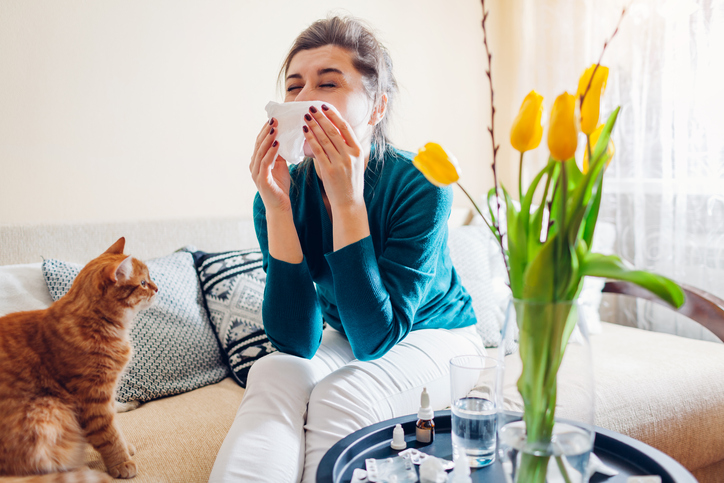Allergies are one of the most common chronic diseases, and most people are affected by them at some point or another, often seasonally. Allergy treatment doesn’t have to be difficult! Allergies are actually one of your body’s defense mechanisms when your immune system targets something you’ve come in contact with as harmful and triggers a response. Although, in the case of allergies, your immune system is overreacting, and causes discomfort such as coughing, sneezing, watery eyes, and headaches. While many people choose to treat these issues with over-the-counter medication, these do not get to the source of the problem. For your allergies, treatment at the source from a doctor is the best choice. Dr. Madsion Richardson is the best allergy treatment doctor in Beverly Hills, with years of experience helping people who are constantly wondering, “who’s the best allergy treatment doctor near me?”. Get the relief from your allergies you’ve been waiting for, and schedule an appointment today.

Diagnosing Allergies
In order to determine whether or not you are experiencing allergies, Dr. Richardson will do the following:
- Perform a physical exam
- ask specific questions regarding your symptoms
- Ask you to keep written track of your possible triggers and symptoms
If Dr. Richardson believes that your symptoms might not be allergy-related, after your evaluation and initial conversations, another test might be necessary to rule out or identify other medical diagnoses.
Allergy Treatment
Treatments for allergies include:
- Avoiding Allergens Dr. Richardson will lay out steps to avoid and recognize the triggers for your allergies. This is typically the number one step to avoid and prevent your reactions and minimize allergy symptoms. Allergy Medicine The proper medicines vary depending on your allergy, but the right ones can assist in reducing the reaction of your immune system and symptoms. . Dr. Richardson might prescribe medicine such as liquids, pills, eye drops, or nasal sprays and depending on the severity of your symptoms, simply over-the-counter medicines.
- Allergy Immunotherapy. This option is best suited for allergies that cannot be relieved by traditional treatment, or severe symptoms. Immunotherapy incorporates injections of allergen extracts that have been purified and given over a period of years. This is a long-term treatment option.
A secondary immunotherapy treatment form is sublingual, which is placing a tablet under the tongue and dissolving it. This sublingual treatment is best suited for the treatment of pollen allergies. - Emergency epinephrine. For the most severe allergy forms, carrying emergency epinephrine might be necessary everywhere you go. An epinephrine shot given for allergic reactions such as EpiPen and Auvi-Q can help bring down symptoms until you are able to seek emergency medical attention.
Lifestyle Changes and Home Treatment
It is possible to reduce certain allergy symptoms at home:
- Hay fever or Sinus congestion symptoms. These symptoms can often be cured with nasal irrigation of saline solution. One product specifically made for this is the neti pot, but you could also use a special squeeze bottle to wash out the irritants and thick mucus in your nostrils. However, only do this method if Dr. Richardson has recommended it as if performed incorrectly could lead to infection.
- Household airborne allergy symptoms. If possible, try to lower your exposure to pet dander and dust mites by washing stuffed toys and blankets in hot water, keeping a low humidity level in your living space, and regularly vacuuming with a HEPA filter.
- Mold allergy symptoms. It is important to lower moisture in damp locations like the kitchen and bath. This can be achieved by using dehumidifiers and fans and fixing leaks in and around your home.
What you can do How to prepare for your appointment
You should contact Dr. Richardsons’ office to determine whether or not you should stop taking your current allergy medications prior to your appointment. Medications taken prior to the appointment might affect the results of your allergy tests. Create a list:
- Of your symptoms, even ones that you believe might not be allergy-related, including when they began. Asthma and allergy history of your family, include as many specifics as possible.
- Every vitamin, medicine, and supplement you currently take, and how much of it. Questions to ask your doctor
- Any questions you may have for Dr. Richardson.
Diagnosing Allergies
In order to determine whether or not you are experiencing allergies, Dr. Richardson will do the following:
- Perform a physical exam
- ask specific questions regarding your symptoms
- Ask you to keep written track of your possible triggers and symptoms
If Dr. Richardson believes that your symptoms might not be allergy-related, after your evaluation and initial conversations, another test might be necessary to rule out or identify other medical diagnoses.
Allergy Treatment
Treatments for allergies include:
- Avoiding Allergens Dr. Richardson will lay out steps to avoid and recognize the triggers for your allergies. This is typically the number one step to avoid and prevent your reactions and minimize allergy symptoms. Allergy Medicine The proper medicines vary depending on your allergy, but the right ones can assist in reducing the reaction of your immune system and symptoms. . Dr. Richardson might prescribe medicine such as liquids, pills, eye drops, or nasal sprays and depending on the severity of your symptoms, simply over-the-counter medicines.
- Allergy Immunotherapy. This option is best suited for allergies that cannot be relieved by traditional treatment, or severe symptoms. Immunotherapy incorporates injections of allergen extracts that have been purified and given over a period of years. This is a long-term treatment option.
A secondary immunotherapy treatment form is sublingual, which is placing a tablet under the tongue and dissolving it. This sublingual treatment is best suited for the treatment of pollen allergies. - Emergency epinephrine. For the most severe allergy forms, carrying emergency epinephrine might be necessary everywhere you go. An epinephrine shot given for allergic reactions such as EpiPen and Auvi-Q can help bring down symptoms until you are able to seek emergency medical attention.
Lifestyle Changes and Home Treatment
It is possible to reduce certain allergy symptoms at home:
- Hay fever or Sinus congestion symptoms. These symptoms can often be cured with nasal irrigation of saline solution. One product specifically made for this is the neti pot, but you could also use a special squeeze bottle to wash out the irritants and thick mucus in your nostrils. However, only do this method if Dr. Richardson has recommended it as if performed incorrectly could lead to infection.
- Household airborne allergy symptoms. If possible, try to lower your exposure to pet dander and dust mites by washing stuffed toys and blankets in hot water, keeping a low humidity level in your living space, and regularly vacuuming with a HEPA filter.
- Mold allergy symptoms. It is important to lower moisture in damp locations like the kitchen and bath. This can be achieved by using dehumidifiers and fans and fixing leaks in and around your home.
What you can do How to prepare for your appointment
You should contact Dr. Richardsons’ office to determine whether or not you should stop taking your current allergy medications prior to your appointment. Medications taken prior to the appointment might affect the results of your allergy tests. Create a list:
- Of your symptoms, even ones that you believe might not be allergy-related, including when they began. Asthma and allergy history of your family, include as many specifics as possible.
- Every vitamin, medicine, and supplement you currently take, and how much of it. Questions to ask your doctor
- Any questions you may have for Dr. Richardson.

